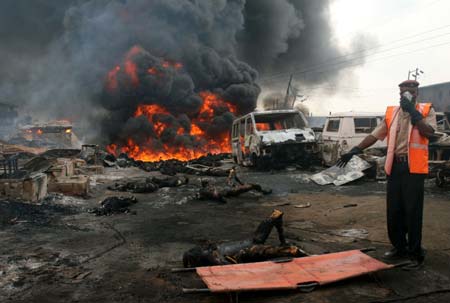Over 260 dead in Nigeria fuel blast
(AP)Updated: 2006-12-27 06:36
LAGOS- A gasoline pipeline ruptured by thieves burst into flames Tuesday as scavengers collected the fuel in a poor neighborhood, killing at least 260 people in the latest oil-industry disaster to hit Africa's biggest petroleum producer.
Braving a towering pillar of flames and a cloud of acrid black smoke, thousands of residents of Lagos' Abule Egba neighborhood surged toward rescue workers carrying away charred bodies, hoping to catch a glimpse of missing family members.
"My brother, my brother," wept 19-year-old Suboke Adebayo as an unidentified
charred male corpse was loaded into a waiting ambulance. Adebayo, a student, had
spent hours trying unsuccessfully to contact her sibling: "I've been calling him
since this morning but I can only hear a holding tone."
A woman in a
yellow T-shirt sobbed uncontrollably, slapping herself on the face and clawing
her own arms in grief.
Residents said a gang of thieves had been illegally tapping the pipe for months, carting away gasoline in tankers for resale.
Pipeline tapping is a common practice in Nigeria, where a majority of the country's 130 million people live in poverty despite their country's role as Africa's leading crude producer.
Massive corruption and mismanagement has left the country's refineries unable
to meet demand and fuel shortages are common. Christians heading home for
Christmas, and Muslims preparing for an upcoming feast day, have jammed filling
stations for days across Lagos, a massive city of 13 million people.
A
single pilfered jerrycan of gasoline, sold on the black market, can equal two
weeks of wages for a poor Nigerian.
Earlier this year, 150 people died in a similar incident and a 1998 pipeline
fire killed 1,500. Many Nigerians feel they've gained little from decades of oil
production in their country, saying gas flaring and oil spills have polluted
lands while they remain poor as only a tiny elite grows rich.
Tuesday's
blast was the worst in years. Thieves opened the conduit but left without fully
sealing it and nearby residents rushed to collect the spurting gasoline with
jerry cans, buckets and even plastic bags, witnesses said.It was unclear what
ignited the spilled fuel just after dawn.
"There were mothers there, little children," said Emmanuel Unokhua, an engineer who lives near the site of the blast. "I was begging them to go back."
Unokhua, who didn't give his age, said that residents had thrown fuel over him and a few police who had been unable to control the crowd.
"They were not arresting anyone because they had no vehicle to put them in," he explained bitterly. "There are plenty of vehicles for the dead bodies now."
Individual bodies lay scattered around the periphery of the site. But for
many victims, only a tiny reminder - a child's flip flop, blistered by the heat
or a half-melted plastic bucket - were the only identifiable items in a fused
mass of bones, skulls and charred limbs.
Flames that nearly incinerated
nearby cars and melted electrical lines to pylons kept rescue workers back from
the site of the main explosion until early afternoon. Bereft crowds impeded the
passage of fire crews and ambulances. Nigerian Red Cross workers had counted 260
dead and taken 60 injured people to hospital so far.
"We are still
counting but there will not be hundreds more," senior Nigerian Red Cross
official Ige Oladimeji said.
UN Secretary-General Kofi Annan expressed
his condolences and called "for a review of the country's fuel supply
management, as well as a thorough regional review of risks that could lead to
other environmental or technological disasters in West Africa," UN spokesman
Stephane Dujarric said in New York.
Residents blamed greed, graft and
poverty for the disaster.
"How can this be, that people are so poor in Nigeria that they will risk their lives for a little thing," said Bode Kuforiji, a 28-year-old university lecturer. "But boats leave for America everyday filled with oil."
|
||
|
||
|
|

